Aug 29, 2007 (CIDRAP News) The United Nations recently established a small team in Geneva to help implement the Biological Weapons Convention, the first international institution created for that purpose.
The Biological Weapons Convention Implementation Support Unit has a staff of three professional officers who will promote adherence to the 1972 treaty banning biological weapons and facilitate communication among countries that signed it, the UN said in an Aug 20 news release.
"Much of the mandate of the Unit is concerned with facilitating communication among States parties [to the convention] and, upon request, facilitating contacts with scientific and academic institutions, as well as non-governmental organizations," said Sergio Duarte, the UN's high representative for disarmament affairs.
The unit will also serve as a clearinghouse for information about "confidence-building measures," provide administrative support to the participating countries, and work to persuade other countries to sign the convention, the UN said.
Richard Lennane was appointed earlier this year as head of the unit, which began operating Aug 2, the UN said. The unit was officially inaugurated with an Aug 20 ceremony in Geneva. The launch coincided with the opening of the 2007 Biological Weapons Convention Meeting of Experts.
The UN said the Sixth Review conference of the Biological Weapons Convention in December 2006 decided to establish the support unit to help countries in their efforts to implement the treaty. "The decision was a landmark in the history of the international community's efforts against biological weapons, as the Convention itself has no provision for institutional support," the statement said.
The international agreements dealing with nuclear and chemical weapons have well-established organizations that oversee their operations (the International Atomic Energy Agency [IAEA] and the Organization for the Prohibition of Chemical Weapons [OPCW]), but no such institution exists for biological weapons, the UN said. The need for such a group has often been noted, but an agreement on how to proceed was elusive until recently.
In the 1990s the treaty countries worked on setting up an agency similar to the IAEA or OPCW but couldn't agree on details, the UN reported. In 2001 the countries decided to take a new approach focusing on better implementation of the existing provisions of the convention, and the resulting process showed the need for a small team to assist countries in those efforts.
The Biological Weapons Convention took effect in 1975 and was the first multilateral treaty banning an entire category of weapons. A total of 155 countries are parties to the convention, according to the treaty's Web site.
See also:
Aug 20 UN news release
http://www.un.org/News/Press/docs/2007/dc3079.doc.htm



















